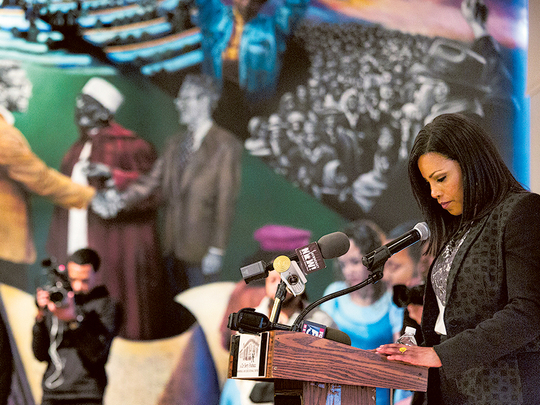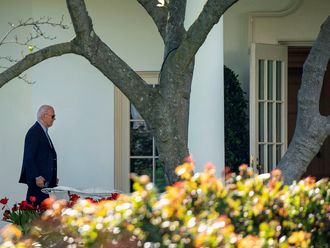
NEW YORK: Several hundred people gathered on Saturday for a moving series of speeches, poetry, songs and prayer to commemorate the short life and evolving legacy of Malcolm X, who was cut down by a hail of assassins’ bullets a half-century ago.
A series of local elected officials, friends, family members and religious leaders used the event to highlight the remarkable transformation of the former Malcolm Little. In his 39 years, Malcolm went from petty criminal and prisoner to Nation of Islam leader and, finally, to a martyr widely celebrated as one of the nation’s most influential human rights leaders.
“Malcolm is a transformational figure,” said Ron Daniels, a longtime activist and president of the Institute for the Black World 21st Century. “His story is one of a life changed. He came out of the ghetto, like so many, but managed to raise himself up to be a leader with a global vision.”
The ceremony was held at the same Harlem ballroom where Malcolm was killed 50 years ago. The former Audubon Ballroom is now the Malcolm X and Dr. Betty Shabazz Memorial and Educational Center, a brightly lit space for the arts and community events with a huge mural depicting pivotal scenes from Malcolm’s life. A blue spotlight marks the spot where he was killed.
“He was just a young man. Just a very, very young man,” said Ilyasah Shabazz, one of Malcolm’s six daughters, who made brief remarks and led a moment of silence for her father. Shabazz, a motivational speaker and author who recently published a children’s book about her father’s life, added: “I hope we make sure his life was not in vain.”
Organisers said two of his other daughters were doing refugee work in Haiti to commemorate the anniversary of their father’s death. The event was streamed via the internet and was just one of a series of memorials across the country to honour the man whose life and death continue to be subjects of debate.
For 12 years, Malcolm X had been a close confidant and charismatic recruiter and organiser who helped Elijah Muhammad lift the Nation of Islam into national visibility. Malcolm X stoked pride in many poor, black communities with his unflinching indictment of whites for their mistreatment of African-Americans and calls for black separatism and black self-defence. That same rhetoric, however, caused him to be denounced as a demagogue by many whites as well as many mainstream civil rights leaders.
But in the years before his murder, Malcolm’s views were evolving. He became estranged from the Nation of Islam and renounced its separatist theology. He formed his own organisations, the Organization of Afro-American Unity and the Muslim Mosque Inc., which embraced Sunni Islam.
The break caused Elijah Muhammad to denounce him as “the greatest hypocrite the Nation of Islam has ever seen.” Scholars have unearthed transcripts from the FBI, which had infiltrated the Nation of Islam and kept files on both Malcolm X and Muhammad, that said Muhammad wanted Malcolm “stopped at all costs.”
The Nation of Islam’s newspaper also branded Malcolm a back-stabber. “Such a man as Malcolm is worthy of death,” Louis Farrakhan, then a top lieutenant to Muhammad, wrote just months before Malcolm’s death.
The article was accompanied by a cartoon depicting Malcolm’s severed head with protruding horns bouncing toward gravestones marked with the names of infamous traitors, from Judas to Benedict Arnold.
Shortly before Malcolm’s death, the Queens home where he lived with his family was firebombed. Then, on February 21, 1965, Malcolm was about to deliver a speech at the Audubon when three gunmen rushed the stage and shot him 15 times.
Three members of the Nation of Islam, including one who was shot and captured at the scene, were convicted of the assassination. But years later, the convict who had been wounded at the Audubon swore out an affidavit alleging that the two other men had been framed and that the murder plot involved five members of the Nation of Islam from New Jersey.
There were also questions about the light police presence at the event as well as the sloppy handling of evidence at the crime scene. Just a few hours after the shooting, for example, the blood was cleaned up and a dance was held at the ballroom.
The murder was often written about “as just another case of black-on-black crime,” said Peter Bailey, who worked with Malcolm before his death. “But we know better.”
Speaking at the commemoration, New York State Senator James Sanders, a Democrat, held aloft manila envelopes that he said contained letters calling on officials from President Barack Obama on down to exert pressure “to reopen this case.”












